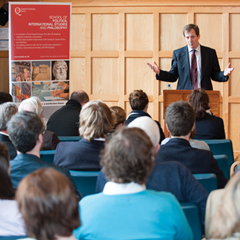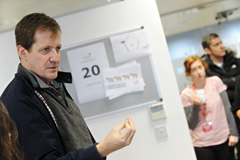Alastair Campbell interview: the spindoctor looks back
 Northern Ireland must accept its current political system, despite its faults, Alastair Campbell contends. Peter Cheney discusses Brown, Cameron, Iraq and Ed Miliband with the ex-spin doctor.
Northern Ireland must accept its current political system, despite its faults, Alastair Campbell contends. Peter Cheney discusses Brown, Cameron, Iraq and Ed Miliband with the ex-spin doctor.
A government without opposition sets Stormont apart at the end of the peace process, but Alastair Campbell insists that its structures must stand.
“Well, you have to work with the system that you’ve got,” he states. “And I think that the whole thing was set up on the basis of parties coming together to share power, and that does produce its own problems; no doubt about it. But that’s the system you’ve got and you’re going to have to work with it.”
Asked to pick out one main positive and one main negative from New Labour, he refuses to be drawn.
“I don’t think you can do one of each. I really don’t. I don’t think that life or politics really works like that,” Campbell remarks. “Winning three general elections was hugely important because if you don’t win elections, there’s absolutely nothing you can do. Then what’s important is what you do with the power that you get and I think that, even though the economy now is not in the place that you want it to be, 10 years of pretty steady growth and prosperity was important.”
The Northern Ireland peace process would have to be put “right up there, at or close to the top,” he continues, adding: “I would also put Kosovo up there, and Sierra Leone, and also I remain absolutely convinced that the decision to remove Saddam was the right thing to do.”
Spin and trust
We return to that point later but, for now, he reflects on 1997-1999, covered in his latest volume of diaries. As Labour had been “so long out of power”, it was “too slow to adapt from campaign methods to government.” It almost seems he got burnt out, it was put to him, and the answer fast forwards to his resignation in August 2003.
“I’m not sure I was burnt out but I was certainly ready to go,” Campbell admits. “I think energy-wise, I was probably still okay. Up here,” he adds, pointing to his head, “I’m not so sure because I think I’d got myself into a position with the media where I could barely bring myself to look at quite a lot of them.” Leaders also “need refreshing around them.”
On the day he got the job on Blair’s staff, back in 1994, he had bumped into Kenneth Baker, Margaret Thatcher’s former Education Secretary.
“Look, I think it’s great for you,” Baker had said. “I think it’s great for Tony, but let me tell you: ‘Nobody can do that job for more than four years.’ I’ll never forget that. And I did for, what, nine full-time, another four part-time as it were, just kinda in and out. I think it was definitely long enough.”
Less trust in politicians is seen as part of the New Labour legacy. Campbell accepts the assertion “up to a point” before suggesting an exception. “When you had the economic crash, who is the first person most British people wanted to hear from at that time? It was the Prime Minister because they knew that he was centrally involved, that he was trying to make things happen.”
His familiar opponent, the media, then re- emerges, with Campbell blaming a “very negative portrayal of politicians and politics” given out 24 hours a day. To this, he adds the parliamentary expenses scandal “even though the level of corruption compared to a lot of other democracies that I could mention was miniscule” and the widely opposed Iraq War.
“But I still think, when push comes to shove, people do understand you have to have politicians,” he continues, although he finds it unfair that politicians are “expected, I think, to be everything.” A good politician will be “absolutely frank”, admit their doubts and “give people a sense of engagement in what is ultimately a very difficult decision-making job.”
Peace and division
All New Labour figures highlight the peace process as a major achievement in government. Its pinnacle came just before Blair’s departure. While Northern Ireland has changed for the better, the peace process could be seen as veneer over the sectarianism and division that still remains.
“To his credit, Martin McGuinness is trying to do something about that,” he comments on the mostly segregated education system.
There is a danger, Campbell adds, “that the system you end up with is, if anything, worse than the one that you started with but the idea of trying to break down those barriers in education is absolutely right.”
Sinn Féin, though, was among the first to criticise Peter Robinson after his call for a single system.
“Certainly, from my sense of what McGuinness was trying to do as Education Minister, I think [it] was well- meant,” he states. “But I agree with you, and I think that until that issue is fundamentally addressed and there is, in a sense, buy-in from both sides of the community [that] that’s the kind of system you need, I think it’s going to be very hard to break down those divisions.”
McGuinness did make it easier to open integrated sector schools, by reducing the required minimum number of pupils, but did not set specific targets for increasing integration.
Labour has allowed Northern Ireland residents to join since 2003 and a province-wide constituency labour party was established in February 2010. Asked about the party standing for elections here, he stalls for moment, pondering what line to take.
“I’m so out of touch, you see,” he laughs. “You all think I’m still there running the thing. I’m not.”
Pressed again, Campbell says he is worried about that having a “detrimental impact” on the SDLP but adds that “if we truly are a united kingdom, then it [the Labour Party] has to operate across the UK.”
While having voted for his brother, he speaks well of Ed Miliband as Labour leader, again criticising “very unfair” press coverage – “plus ça change” in his words.
“On policy, and on some of the other decisions he’s making, I actually am quite impressed by what I’ve seen,” he remarks, welcoming how Miliband “doesn’t appear to be too fazed” by the media: “He knows he can take his time. He’s got to establish himself.”
Miliband is “doing pretty well” in Prime Minister’s questions, a vital arena.
“I think he gets under Cameron’s skin. I don’t think Cameron likes being challenged. I don’t think he likes being quizzed too closely on some of his barmpot policies. I see his Big Society’s falling around his ears today,” Campbell adds, referring to claims that cuts are undermining volunteering.
His low profile is a weakness but that’s also a “big opportunity” as he can “start to get to know the public and have a relationship with the public on his own terms.”
Some of the new leader’s attempts to draw a line under New Labour don’t sit easy. Miliband is “absolutely right” to say that lessons must be learnt from the things that were “deemed to have gone wrong” but Campbell has advised him to “learn lessons from the things that went right.”
“A lot of the best changes that we made were because we took a very different course to the one Old Labour would have done.
“Now, I don’t think Ed is Old Labour and I think ‘new generation’ is fine for me because ultimately it is a new generation,” he comments. “And I think it was a way of saying: ‘Let’s put the whole Blair-Brown thing behind us.’”
Unprompted, he dismisses talk of divisions between Ed Miliband and Shadow Chancellor Ed Balls, who both lived through that rivalry.
Helping Brown
Campbell briefed against Brown as Chancellor but was invited back to help him after he became PM. Asked if this was a sign of desperation, on Brown’s part, he sighs.
“I think this is the reason why the diaries ultimately – without being pompous – I think they’re quite an important historical document about politics, because ultimately politics is about people,” he responds. “It’s about trying to serve people but it’s also about the individuals who form a team at the top of a political organisation; that’s an important part of it.”
Tensions between Blair, Brown, Campbell and Mandelson are all written up. However, Brown was prepared to let the past go and Campbell returned as a part- time advisor: “I got on really well with him during the last election, and I think I was actually able to make a contribution.”
History will “definitely” judge Brown more kindly over the economic crash.
“In relation to his role vis-à-vis Tony, I don’t know,” he surmises. “I do feel that if all of us had been able to work always genuinely as a team, I think we’d have been more successful. And I think, actually, we could have won another term.”
The Iraq legacy
Campbell accepts the perception that going to war was the high point of spin will always be part of Blair’s legacy but claims that the anti-war case can be hypocritical.
“I did an interview yesterday on Eamon Dunphy’s programme. Robert Fisk, the Independent guy, came on from Cairo and he was basically saying, or he seemed to me to be saying, that the Americans aren’t doing enough here to get rid of Mubarak,” Campbell recalls.
“[These are] the self-same people, who castigate the Americans whenever they throw their power around and throw their weight around in other circumstances, including with a dictator far worse that Mubarak’s ever been, namely Saddam.”
History, he predicts, will be more generous when it considers Hussein’s track record, including using chemical weapons against Iraqis and starting the Iran-Iraq War.
“It’s almost as if that gets parked, and the people who oppose what we did do have to say, and do have to accept, that had we done nothing then the chances are he’d still be there or his sons would be there running the place,” Campbell states. He thinks most people have made their minds up either way and concludes: “I can only speak as I found it at the time.”






